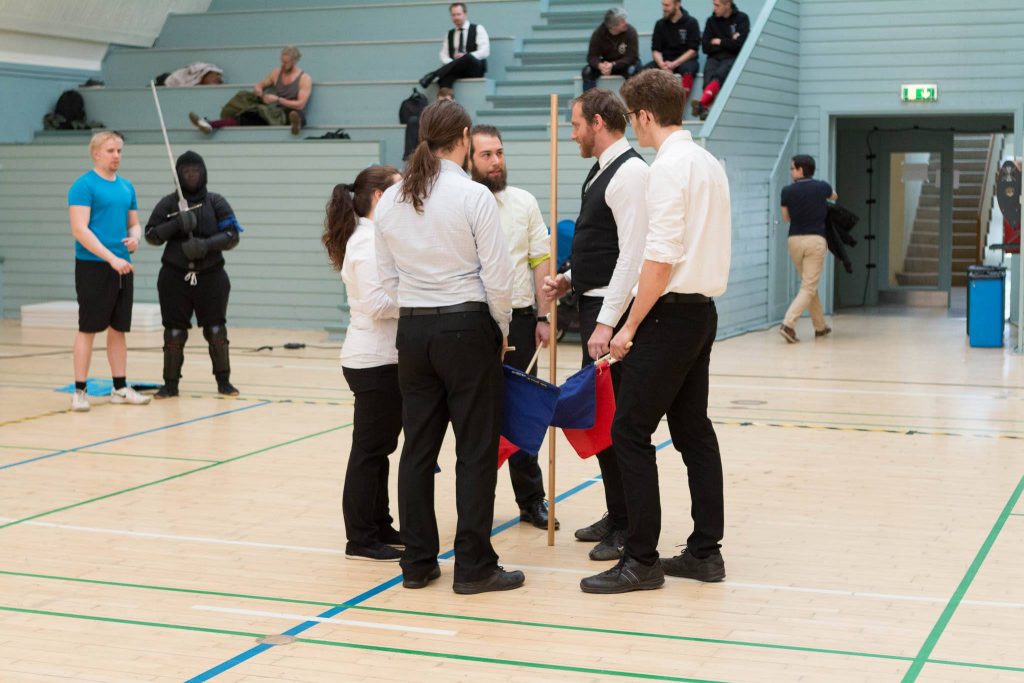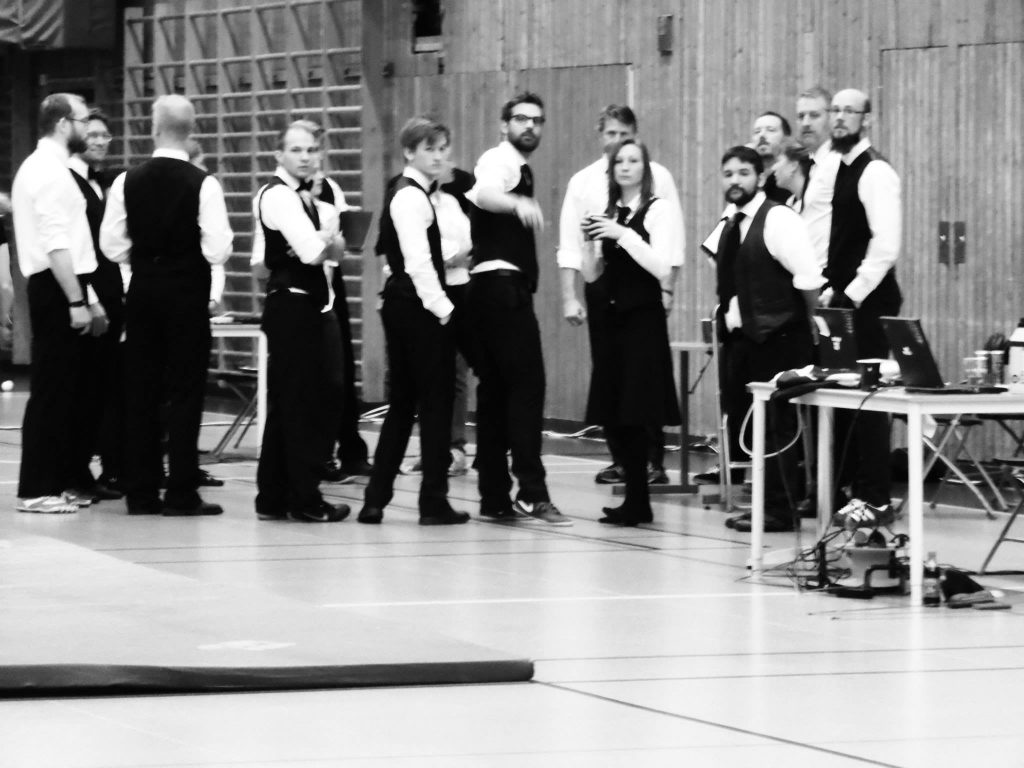We use cookies
Using our site means you agree to the use of cookies and similar technologies. Read about our policy and how to disable them here
 What do I mean by watching alertly? I mean that in watching a fencing exchange, you should have a mental construct of what’s going on, just as if you were fencing yourself, that lets you predict likely outcomes. By doing so you’ll increase the accuracy of your observations because you’ll only have to pick from a few possibilities to recognise what’s happening. This does, however, have limits. If your model is inaccurate, then you may be misleading yourself. Or perhaps a fencer just chooses a “wrong” option and takes you by surprise with their unlikely choice. If so, it’s a test of your skills to recover, in both observation and theoretical conception of the fight! Along with the need to move outlined above, I often catch myself making small motions in sympathy with one or both fencers as I attempt to model their fight!
Once you’ve seen, know what you’ve seen. Immediately focus on what you saw and remember/identify what happened. I often screw my eyes shut in this phase to help me concentrate. If you don’t know what you saw, how can you call it? Yet too often I observe judges shrugging and deciding “Oh, it must have been X”, despite not having seen it. Yes, your observations are inherently flawed - science tells us so - but it’s still worth trying to analyse them immediately when they’re fresh rather than waiting until it’s time to raise the flags or detail the score. If you didn’t see anything that scored, admit it. Don’t pretend you saw a hit just to keep your “I am an all seeing Blazing Eye of judging prowess” reputation intact.
Brace yourself to be wrong. Senses are misleading, and fill in “missing” details all the time. Quite literally, you see things that aren’t there. Even being as accurate and honest as you can, you’ll make completely incorrect calls, based on incorrect observations. Get used to it and get over it. I approve when tournaments allow protests by fencers, or at least conceding points that were awarded by incorrect calls. Judges can and will be wrong, and pretending they won’t serves to alienate fencers and breed resentment. If you start to notice you’re fuzzy, burned out, or too tired to concentrate, try to take a break. Any decent tournament should have a rotation system for referees and judges to let them recover a bit before going back to the piste. I suggest lots of snacks and caffeine too, but then again that’s my advice for life itself.
It’s regrettable that I have to say this, but make your calls according to the rules, not by “feeling” or “ought to win”! Too often, points are awarded with a weighting for a fencer’s reputation, for how artful the fencer looked, or because the judge felt sorry the fencer lost a point the judge saw but was outvoted on in the last exchange. This doesn’t even have to be a conscious thing - often the judge is just primed by their expectations into seeing phantoms. When they have a doubt though, they should go by the book. Now, judges are human (or at least humanoid) enough to have feelings. That doesn’t mean they can put those feelings above the rules. Even if the rules are stupid or counter-intuitive or need adjustment (it’s an irregular adjective - my rules are a work in progress that might be amended based on this tournament experience, your rules are unclear and lead to odd results, his/her/its ruleset is a nonsensical, Alice-in-Wonderland joke) the judge’s job is to watch the fencing and decide how that ruleset gives points. If the ruleset doesn’t reflect the fight, raise the issue the next time you see the organizers, but don’t give yourself the right to amend it mid-fight.
What do I mean by watching alertly? I mean that in watching a fencing exchange, you should have a mental construct of what’s going on, just as if you were fencing yourself, that lets you predict likely outcomes. By doing so you’ll increase the accuracy of your observations because you’ll only have to pick from a few possibilities to recognise what’s happening. This does, however, have limits. If your model is inaccurate, then you may be misleading yourself. Or perhaps a fencer just chooses a “wrong” option and takes you by surprise with their unlikely choice. If so, it’s a test of your skills to recover, in both observation and theoretical conception of the fight! Along with the need to move outlined above, I often catch myself making small motions in sympathy with one or both fencers as I attempt to model their fight!
Once you’ve seen, know what you’ve seen. Immediately focus on what you saw and remember/identify what happened. I often screw my eyes shut in this phase to help me concentrate. If you don’t know what you saw, how can you call it? Yet too often I observe judges shrugging and deciding “Oh, it must have been X”, despite not having seen it. Yes, your observations are inherently flawed - science tells us so - but it’s still worth trying to analyse them immediately when they’re fresh rather than waiting until it’s time to raise the flags or detail the score. If you didn’t see anything that scored, admit it. Don’t pretend you saw a hit just to keep your “I am an all seeing Blazing Eye of judging prowess” reputation intact.
Brace yourself to be wrong. Senses are misleading, and fill in “missing” details all the time. Quite literally, you see things that aren’t there. Even being as accurate and honest as you can, you’ll make completely incorrect calls, based on incorrect observations. Get used to it and get over it. I approve when tournaments allow protests by fencers, or at least conceding points that were awarded by incorrect calls. Judges can and will be wrong, and pretending they won’t serves to alienate fencers and breed resentment. If you start to notice you’re fuzzy, burned out, or too tired to concentrate, try to take a break. Any decent tournament should have a rotation system for referees and judges to let them recover a bit before going back to the piste. I suggest lots of snacks and caffeine too, but then again that’s my advice for life itself.
It’s regrettable that I have to say this, but make your calls according to the rules, not by “feeling” or “ought to win”! Too often, points are awarded with a weighting for a fencer’s reputation, for how artful the fencer looked, or because the judge felt sorry the fencer lost a point the judge saw but was outvoted on in the last exchange. This doesn’t even have to be a conscious thing - often the judge is just primed by their expectations into seeing phantoms. When they have a doubt though, they should go by the book. Now, judges are human (or at least humanoid) enough to have feelings. That doesn’t mean they can put those feelings above the rules. Even if the rules are stupid or counter-intuitive or need adjustment (it’s an irregular adjective - my rules are a work in progress that might be amended based on this tournament experience, your rules are unclear and lead to odd results, his/her/its ruleset is a nonsensical, Alice-in-Wonderland joke) the judge’s job is to watch the fencing and decide how that ruleset gives points. If the ruleset doesn’t reflect the fight, raise the issue the next time you see the organizers, but don’t give yourself the right to amend it mid-fight.
 If you have the role of halting the match when hits occur or on the judges' call then halt it quickly, emphatically, and without leeway. Nothing is less safe than the afterblow thrown when one fencer has stopped. Yes, there's the "protect yourself at all times" rule, but once a fencer has been instructed to halt he shouldn't have to parry multiple shots. Not only is there the danger, but it also confuses judges. It's an example of how firm refereeing is not just better refereeing, but to the fighters' benefit. If the rules are firmly enforced, there's no risk of escalating bad blood on the "so, that's how we're playing today?" basis. If the first late shot is punished, you'll see a lot less of them. If they're firmly and consistently enforced, then there's no risk of "how come I get the penalties when he did it first", either. The ability to warn a fencer without seeming like another opponent is in itself a skill - a shout out here to Marcin, Lukas and others in the Polish FEDER league who are masters of the wagging finger accompanied by a wry smile.
Finally, try to practice tournament judging with the same concerns for mindset and endurance (both physical, mental and emotional) that come into play when practicing for tournament fencing. Judging is exhausting, not just physically. Too often I’ve seen mentally tired judges or even emotionally exhausted referees making spectacles of themselves because they’ve pushed themselves past their limit. If your ruleset has a judge/referee role to manage the fencers (rather than simply score) this emotional component is even more important. Like a referee in any sport - soccer, boxing, weightlifting - there’s a need for authority. Fencers must respect your calls. However, respect is not a synonym for fear, or even for aloofness. A little bit of understanding and calm can go a long way.
Finally, practice more!
If you have the role of halting the match when hits occur or on the judges' call then halt it quickly, emphatically, and without leeway. Nothing is less safe than the afterblow thrown when one fencer has stopped. Yes, there's the "protect yourself at all times" rule, but once a fencer has been instructed to halt he shouldn't have to parry multiple shots. Not only is there the danger, but it also confuses judges. It's an example of how firm refereeing is not just better refereeing, but to the fighters' benefit. If the rules are firmly enforced, there's no risk of escalating bad blood on the "so, that's how we're playing today?" basis. If the first late shot is punished, you'll see a lot less of them. If they're firmly and consistently enforced, then there's no risk of "how come I get the penalties when he did it first", either. The ability to warn a fencer without seeming like another opponent is in itself a skill - a shout out here to Marcin, Lukas and others in the Polish FEDER league who are masters of the wagging finger accompanied by a wry smile.
Finally, try to practice tournament judging with the same concerns for mindset and endurance (both physical, mental and emotional) that come into play when practicing for tournament fencing. Judging is exhausting, not just physically. Too often I’ve seen mentally tired judges or even emotionally exhausted referees making spectacles of themselves because they’ve pushed themselves past their limit. If your ruleset has a judge/referee role to manage the fencers (rather than simply score) this emotional component is even more important. Like a referee in any sport - soccer, boxing, weightlifting - there’s a need for authority. Fencers must respect your calls. However, respect is not a synonym for fear, or even for aloofness. A little bit of understanding and calm can go a long way.
Finally, practice more!
